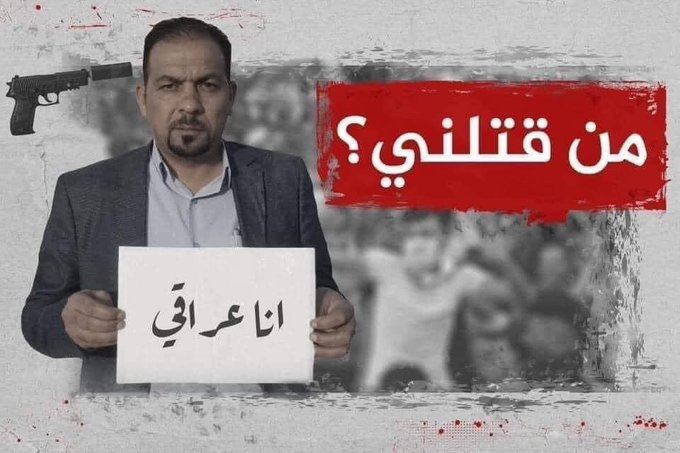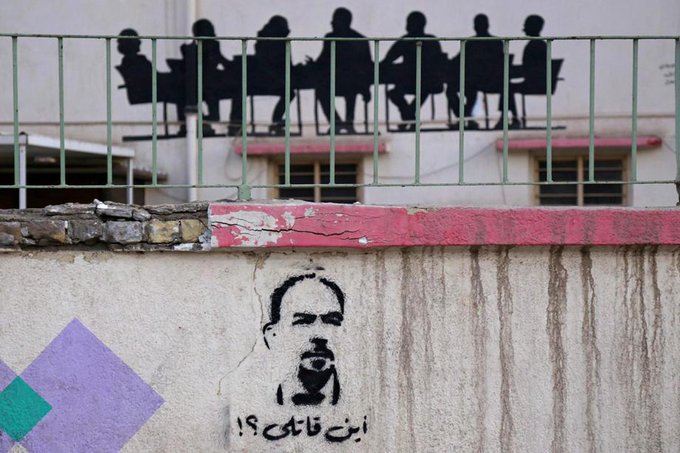Protest are called in Iraq for Tuesday, May 25th. They were called by Ihab al-Wazni -- before he became the latest activist to be assassinated in a wave of assassinations that has gripped Iraq for months now. Ihab's family reaffirmed last week that the protests to take place tomorrow after Ihab became yet another 'unsolved' mystery.
Sura Ali (RUDAW) reports this evening:
A human rights watchdog has warned against the use of violence against protesters, calling on the government to protect them ahead of a mass demonstration scheduled for Tuesday in Baghdad.
“The Iraqi Observatory for Human Rights warns the government against using violence against demonstrators. Thousands prepare to demonstrate again in Baghdad. The government should protect them,” the observatory tweeted on Monday.
Huge crowds from the central and southern provinces will set out towards the capital, Baghdad, to the city’s Nisour and Firdos squares as headquarters for the protests. Activists said that there is high coordination between demonstrators in different provinces.
"We may go towards the Green Zone to pressure the government to reveal the killers of the demonstrators and activists and bring them to justice," activist Ridha Hajwel told Rudaw English.
The demonstrations were called for by prominent Karbala activist Ihab al-Wazni, days before his assassination earlier in May.
Why would they need protection?
For starters, Saturday saw the assassination of activist and political candidate Hashem al-Mashhadani.
The same day, activist Imad al-Aqili survived an assassination attempt.
Before that, journalist Ahmed Hassan survived an assassination attempt (and required brain surgery as a result of the attempt).
It is a wave of assassinations. Louisa Loveluck and Mustafa Salim (WASHINGTON POST) reported a few weeks ago:
That moment did not last: Iraq’s human rights commission says it has registered 81 assassination attempts against anti-
government activists and journalists since the protests began. At least 34 have been killed, almost a third of them after the appointment of a new prime minister, Mustafa al-Kadhimi, who came to power vowing justice for the slain activists.
Mounting threats are now being made against their friends and associates. Disillusionment and fear have forced many into exile. “They came to my father two weeks ago and told him my name was on their list” said one photographer, speaking on the condition of anonymity out of concern for his family’s safety in Baghdad.
To be very clear, THE WASHINGTON POST was the only US newspaper to report on Ihab's assassination.
Iraqi High Commission for Human Rights' Ali al-Bayati tells Mina Aldroubi (THE NATIONAL), “Such ongoing killings are considered terrorist acts as they target the country’s national security, as well as impact the credibility of the coming elections. The state must end impunity by taking real steps to refer to security officials whose responsibility is to end the violence through investigation."
Impunity?
Last week, Belkis Willis (Human Rights Watch) observed :
Many of these killings and abductions have targeted the people who were leading voices during the demonstrations and journalists who covered the unfolding events in Baghdad and other centers of protest. Despite the gravity and scale of the ongoing assassination campaign, Kadhimi's government has failed to ensure any accountability or justice.
Soon after taking office, Kadhimi established a committee last May to investigate and hold accountable those behind the killings of protesters—but it has yet to publish any findings. There are few other signs that he has made any other progress. Armed groups have become so brazen that gunmen have no fear approaching someone in the middle of the street in a major Iraqi city and shooting them without consequence.
Perhaps the strongest message of impunity was sent by the killers of Dr. Hisham al-Hashimi, a member of the political elite in Baghdad and a close ally and adviser of the prime minister, who was assassinated in July 2020. Despite Kadhimi's commitments to hold his murderers to account— "We promise the killers that we will go after them so they may be served their just punishment," he said—the crime went unpunished. It felt to me, and to many others, like a checkmate moment between these killers and the Iraqi government.
Over and over these crimes are not punished. These acts of terrorism are not punished. As noted this morning at THE COMMON ILLS:
Iraq's president Barham Salih gave a major televised address yesterday, he invoked terrorism and crime, but he never said a word about the real terrorism of targeting activists, the real crime of these continued assassinations. Barham made clear that his personal god is Greed and that he worships at the alter of avarice.
Who's behind these assassinations? Ihab's family is very clear that they believe he was killed by members of the militia (which are now a part of the Iraqi government forces). Alican Tekingunduz (TRT) notes, "Dr. Tallha Abdulrazaq, a security expert on the Middle East from the University of Exeter, told TRT World that the nature of the killing suggests that pro-Iranian Shia militia groups are behind the assassinations of both Al Wazni and several other prominent Iraqis. "
Where is the world's attention? Elsewhere. When it comes to Iraq, it's always attention elsewhere.

